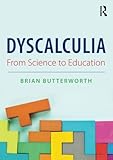Dyscalculia : from science to education / Brian Butterworth.
Material type: TextLanguage: English Publication details: Abingdon, Oxon ; New York, NY : Routledge, c2019.Description: xiii, 187 pages : illustrations ; 25 cmContent type:
TextLanguage: English Publication details: Abingdon, Oxon ; New York, NY : Routledge, c2019.Description: xiii, 187 pages : illustrations ; 25 cmContent type: - text
- unmediated
- volume
- 9781138688612 (paperback)
- RJ496 A25B98 2019
| Item type | Current library | Collection | Call number | Materials specified | Status | Notes | Date due | Barcode |
|---|---|---|---|---|---|---|---|---|
 Books
Books
|
Ladislao N. Diwa Memorial Library Reserve Section | Non-fiction | RUS RJ496 A25B98 2019 (Browse shelf(Opens below)) | Room use only | 78247 | 00079193 |
Includes bibliographical references and index.
What is dyscalculia? : it's not just being bad at maths -- Number sense : our intuitive understanding of numbers -- The arithmetic starter kit -- Core deficit in the number module : the cognitive cause of dyscalculia -- Development of arithmetic depends on domain-specific numerical competences -- The dyscalculic brain -- Heritability and the effects of brain damage on numerical abilities -- Society, school, and home -- Assessment : how to identify dyscalculic learners -- Intervention for dyscalculic learners -- Policy : what to do about dyscalculia locally and nationally.
"Dyscalculia is caused by developmental differences in the structures and patterns of activation in the brain. Affected learners require timely and tailored interventions, informed and shaped by neurological findings. In this ground-breaking text, Professor Butterworth explains the latest research in the science of dyscalculia in a clear non-technical way. Crucially, he shows that dyscalculia is caused by a core deficit in the ability to accurately and swiftly represent the number of objects in a set, an ability that underpins learning arithmetic, and clearly differentiates dyscalculia from other forms of early mathematical learning difficulties. Butterworth uniquely links research to pedagogical practice, to explain how science can be used for the identification of dyscalculia, and for the development of strategies to best help affected learners acquire arithmetical competence. The text provides robust interventions that focus on helping pupils to strengthen their ability to process numerosities and link them to the familiar number symbols, counting words and digits. It shows that science has clear specific implications both for assessment and intervention. A landmark publication for the dyscalculia community, Dyscalculia: From Science to Education will become an essential resource for teachers, professionals, parents and sufferers, as well as for university courses that include specific learning disabilities."--Back cover
Fund 164 CD Books International, Inc. Purchased 11/18/2020 78247 pnr PHP 2,268.00 2020-10-371A 2020-1-0324

